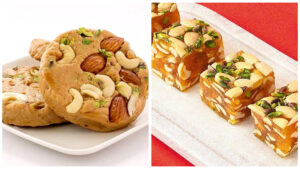In the bustling lanes of Chandni Chowk, where history speaks through aromas and flavors, there stands a name that has been synonymous with authentic sweets for over a century – Chaina Ram Sindhi Halwai.
A Journey from Sindh to Delhi

The story begins in 1901, in Karachi, Sindh (now in Pakistan). Chaina Ram, a master halwai, was known for his unmatched craftsmanship in creating mithai that melted hearts – from rich besan laddoos to fragrant sohan halwa. His shop quickly became a landmark for locals and travelers alike.
When the Partition of 1947 changed the map of the subcontinent, it also changed the destinies of many. Leaving behind their flourishing business in Karachi, the family carried with them not just memories, but also their secret recipes and an unshakable commitment to quality. They restarted their journey in Delhi’s Chandni Chowk, setting up shop in Fatehpuri, right opposite the grand Fatehpuri Masjid.
Why Chaina Ram Still Stands Apart
Even after more than a hundred years, the shop still works on traditional methods — pure desi ghee, hand-roasted ingredients, and recipes that haven’t been tampered with for modern shortcuts. The most famous creation? Their Sohan Halwa — a rich, nut-filled delicacy that has fans across the globe.
From besan laddoo that crumble in your mouth, to karachi halwa with its jewel-like gleam, every sweet here is a slice of history served in silver.
More Than Just a Sweet Shop
For generations of Delhiites, Chaina Ram is not just a mithai shop — it’s an emotion. Families bring their children here to taste what their grandparents once enjoyed. During festivals, the shop is so crowded that customers line up hours in advance, proof that tradition never goes out of style.
A Legacy That Lives On
Today, the name Chaina Ram is a badge of honor in the Indian sweet world. It’s a story of resilience, migration, and the power of keeping traditions alive through changing times. In every bite, you can taste not just sweetness, but history itself.
END OF ARTICLE…!!